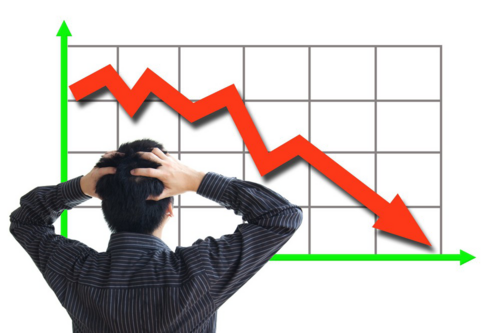Effective Ways to Overcome Market Crash in the Global Economy

The global economy is in flux, and many investors are feeling the impact. This unstable environment has led to widespread panic, which has caused some people to make irrational decisions with their investments. To overcome this difficult time, individuals need to understand how these crashes happen and what steps they can take to minimize the damage done. There are different ways that investment crashes occur, and each one presents its own set of risks and challenges.
The investment crash is a devastating event that has impacted many people differently. However, by being prepared for the crisis and employing various methods to overcome it, most people were able to restore their wealth and rebuild their lives.
A few effective ways can help investors overcome these crashes and stay safe throughout this turbulent time. Let's get started!
What is a market crash?
The term "market crash" refers to a sudden and sharp decline in the value of one or more markets or assets that can trace directly to an economic factor. Such as a shortage of currency or a decline in demand due to bad weather or political events, or because there has been a market bubble inflated by excessive exuberance or greed among investors (people who trade securities).
The market crash can also be seen as anything from a mild drop in prices to a total market collapse in less than a day. It can happen when there is too much demand for one particular product, and the sellers cannot supply enough to meet that demand. Hence, prices start to drop rapidly to try and clear out excess stock before it falls into the hands of someone else who wants it more than you do or who will pay less than your price because they are buying on credit, etc.
A market crash may be temporary, with prices recovering in days or weeks. However, a market crash can signal the start of a more prolonged downturn that can last for months or even years. A perfect example is the U.S housing market crash of 2007, which started with a relatively mild decline in home prices leading up to 2005.
What causes a market crash?
 An eventual crash is inevitable in a market so full of madness.
An eventual crash is inevitable in a market so full of madness.
The best place to start is with "Why did it happen" (what caused the crash)? And then from there, you can get an idea of what caused the crash, how it was created, and why people didn't do anything about it until it was too late to prevent it from becoming so big that nobody could recover from it before it became terrible. It would cause substantial social upheaval, leading to chaos, war, economic collapse, etc. This seems to be the same problem we are facing now: a large-scale problem that is not being dealt with but will become much worse over time without being dealt with, creating massive civil unrest which may lead to widespread chaos and mass death from starvation, etc. So we need to try to understand this problem and hopefully find some way to solve it. The first step is to understand the reason for the crash.
A common answer is that there are just too many people trying to buy assets simultaneously or too much money being thrown into the market by too many investors. This leads to over-speculation and a bubble that bursts when it inevitably collapses under its weight in a process known as a "crash."
For instance, an economic bubble occurs when too many people try to buy assets such as stocks, crypto, bonds, etc., resulting in overinflated prices and consequently more losses than gains for those who try to sell them when the SMART MONIES (top firms and individual wealthy investors) have already left the market. This leads to widespread bankruptcies, as individuals or businesses with debts cannot afford to pay off their mortgages and can no longer keep up with their interest payments on their loans, so they default and lose all their assets.
When investors start to sell their assets as they believe market prices are unrealistic and will fall in the future, this can cause wide-scale panic selling of assets. This creates a downward spiral of further market price falls as investors lose confidence in holding a particular asset and selling it as quickly as possible.
Every investor lives with the risk of a major economic meltdown, no matter how small. It has occurred before, and it can happen again. If it does, years of hard-earned savings and retirement funds could be wiped out in hours, days, weeks, or months.
Fortunately, you can take measures to safeguard most of your assets from a market crash or even a global economic depression. Preparation and diversification are the pivotal elements of a sound defensive strategy. Altogether, they can help you withstand a financial storm.
Diversify
Diversifying your portfolio is possibly the single most significant measure that you can take to safeguard your investments from a severe bear market. In other words, if you're 100% invested in one particular stock or sector, then when the market goes into freefall, you will be devastated financially and emotionally, as well, as it might take years to recover from such an experience!
Diversification means exposure to different assets, including stocks, bonds, crypto, etc, and being exposed to various sectors of the economy (e.g., banking/finance, consumer discretionary, technology, etc.). However, if you diversify too much, you risk spreading yourself thin and thus exposing yourself to potential risks that might impact your investment returns.
Be Quick to Run to Safety
Whenever natural market turbulence or new unfavorable policies are enacted by the government in most notable nations of the world, most people quickly liquidate their assets into cash equivalents. You may also want to do the same if you can do it before the crash.
Although this depends on the economic sector you invested in. You can always get back in when prices are much lower. Then, when the trend or economy eventually reverses, you can profit much more from the appreciation.
When you wait too long to exit the market during a turbulent time, you may be forced into a position that is not the best for you financially to maintain capitalization and stay profitable, if at all possible.
Make Guaranteed Investments
You may likely don't want all of your savings in guaranteed investments. They don't pay off well enough. But it's wise to keep at least a small portion in something that isn't going to fall with the markets. The best part about this is that you can be confident that you have some money set aside to take care of yourself, so if things go south, you won't be too worried because you have a safety net in place.
Bank certificate of deposit (CD) and Treasury securities are a good bet for the long term, especially if they earn higher yields than what you'd get on your money in cash or other investments that pay little interest (like government bills). That's why these are often called "safety" issues. If rates go up, your principal is protected; but as long as rates stay low, the return is generally higher than that offered by cash or Treasuries (which also come with risks). The downside is that it can take years to make back what you paid.
Hedge Your Bets
When you see a significant downturn ahead, don't hesitate to set yourself up to profit directly from it. There are several ways you can do this, and one of the best is by hedging your bets with options trading strategies designed to take advantage of declines in stock prices and other financial markets.
One popular strategy is buying covered calls, which pay out if the underlying security price falls enough, so the call expires worthless. This means that you have earned 100% on your money (unless the option contract was written so the writer could exercise his right to repurchase the shares at the strike price). This strategy works great when a particular company has been experiencing declining sales over time but is currently selling at a premium because of investor optimism.
Offset Your Debts
Do you have considerable debts, you may be better off liquidating some or all of your holdings and settling off the debts if you see bad weather approaching in the markets. You will probably lose money doing this, but it's possible that the loss could be less than what you would have suffered if you had kept the assets in place and the market went down when you needed to sell them most heavily because they were now worth much more than they were then.
Suppose you are going to pay down debt. You might consider making a lump sum payment over time rather than paying it off install mentally. This could cause problems with your retirement savings or investments if you cannot afford them now because you are losing money on the market and need the cash to live on during the worst of times before things improve.
In Summary
Finally, remember that while a crash is never easy, it is essential to emerge stronger. Don't give up on your goals, and don't let the market defeat you. Use these tips to make the most of a difficult situation and succeed where others have failed.
There is no one answer to overcoming an investment crash. However, staying informed, having a plan, and being resilient are all essential steps in avoiding a crash and succeeding when it does happen. In the last five years or so we have witnessed some of the most extreme market corrections on record.
I believe we are likely headed for another one soon as markets continue to be driven by exuberance fueled by easy money from central banks around the world. Hence the rising government deficits that are rapidly growing our national debt, and further eroding investors’ confidence in their ability to withstand a significant loss of wealth over some time if they should choose to do so all without negative implications for the economy.
Disclaimer: This article is provided for informational purposes only. It is not offered or intended to be used as legal, tax, investment, financial, or other advice.


